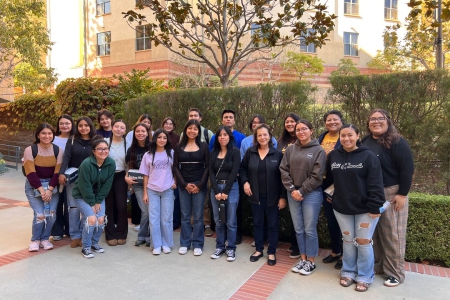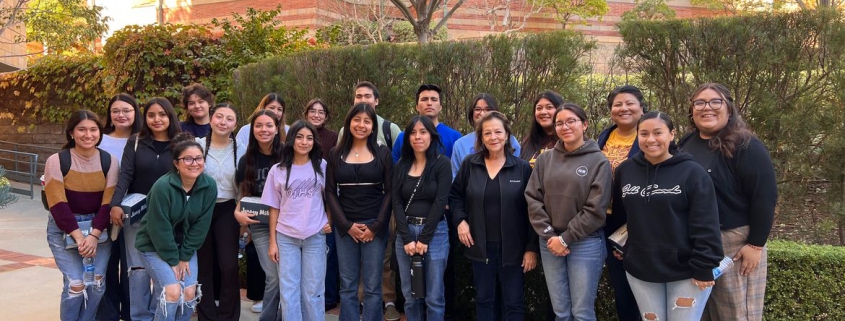Latinx Success Center blossoms on UCLA campus to unify students, community

Students and organizers near De Neve, where the Latinx Success Center will be housed. “A place where our students feel like home,” Claudia Salcedo, back row, second from right, described the vision for the space.
- The Latinx Success Center will open on the UCLA campus with a celebration on Cesar Chavez Day to help support students and the community.
- The center, part of UCLA’s efforts to become a Hispanic-Serving Institution, will focus on student achievement and excellence.
- UCLA earned the Asian American and Native American Pacific Islander-Serving Institution during the last academic year and is considered an emerging HSI.
“A place where our students feel like home” is how Claudia Salcedo described the vision for the Latinx Success Center.
Salcedo, assistant vice provost for academic partnerships, is one of hundreds of staff, faculty, students and alumni who came together to bring the center into fruition. As part of UCLA’s efforts to become a Hispanic-Serving Institution, or HSI, this new campus hub will focus on student achievement and excellence.
In 2022, the HSI task force released “The Seeds of Change,” a report detailing how UCLA could reach that federal designation, a goal set in 2020 by then-Chancellor Gene Block. University of California President Michael Drake issued a similar directive for all UC campuses to earn dual minority-serving designations as HSIs and Asian American and Native American Pacific Islander-Serving Institutions. Both leaders emphasized the need to better address gaps in student opportunity and success amid the state’s changing demographics — about 40% of Californians are Latino, according to the U.S. Census Bureau.
The report recommended establishing a resource center at UCLA, where 24.2% of undergraduates are Latino, to help improve experiences and academic outcomes with culturally responsive services for students and information for staff and faculty.
The seed planted for the center will be in full bloom later this month as the campus — under Chancellor Julio Frenk, the first Latino to lead UCLA — celebrates its official opening on the Hill at De Neve Birch.
“It is critical that UCLA be a place of belonging — a place where everyone is valued, and everyone adds value,” said Frenk. “The opening of this center is part of our commitment to fostering an inclusive and supportive environment where all students can thrive.”
Modeling inclusive excellence
More than 600 U.S. institutions are identified as Hispanic-Serving Institutions. As the No. 1 public university and a top-tier research institution, UCLA aims to show that excellence and inclusion are inseparable when it comes to education. UCLA earned the AANAPISI designation during the last academic year and is considered an emerging HSI.
“Success” in the name demonstrates the center’s commitment to not simply being a space for students and organizations to come together, but also a community where all Bruins — including Latinx, first-generation and low-income students — can thrive and reach their highest potential, Salcedo says.
During the third annual Latinx Welcome last fall, Adriana Galván, dean and vice provost of undergraduate education, announced the creation of the center, which will be overseen by her division in partnership with student affairs through Salcedo’s office.
“This center draws on the courage, activism, inspiration and example of countless people over many years,” Galván said. “It is deeply inspiring to honor their vision for a better tomorrow by investing in our remarkable students even more intentionally today.”
The center will provide advising and academic services to drive retention and improve graduation rates, she says, as well as leadership and mentorship programs to help students prepare for careers and life outside the university.
Elizabeth Gonzalez, the inaugural director of UCLA’s HSI initiative, hopes the new center, with its focus on cross-campus synergy and best practices for advancing academic achievement and student belonging, can be a model for other institutions.
“This work will show the community they belong at UCLA,” she said. “And that UCLA is not just in Los Angeles, but of Los Angeles.”
Informed by other models like the Black Bruin Resource Center, the space, which all students are welcomed to visit, will include areas for studying and scholarly presentations, and a pantry stocked with foods familiar to Latino students.
The office of Executive Vice Chancellor and Provost Darnell Hunt helped provide startup funds for the center. The HSI initiative also received external funding to establish the Latinx Success Center and sustain it through the next three years and support the Excelencia Scholarship, a needs-based program to increase affordability and access to UCLA.
Focused on and led by students
“As a member of the Oaxacan and indigenous community on campus, students like myself face complex barriers in higher education, such as overcoming systemic exclusion and navigating spaces where our culture is rarely recognized,” said Diego Emilio Bollo, a third-year labor studies and political science major. “Students believe this center can represent a commitment to acknowledging and celebrating our diversity.”
Because the center’s organizers know engaged collaboration is key to helping students overcome some of these issues, they sought out student voices and perspectives.
Daniela Cortez Bravo, one of the HSI student liaisons who graduated last year, helped lead listening sessions with Bruins to create a shared vision for the new center, including operations and design.
“We wanted the center to be guided by what students want,” she said. “It’s important for students to take up space.”
Jonathan Valenzuela Mejia, another recent graduate, made the center one of his priorities as an elected representative for the Undergraduate Student Association Council. He helped pass a resolution reaffirming the center’s importance and created the Latino caucus to bring student organizations together to discuss the community’s needs.
The first in his family to attend college in the U.S., Mejia understood how fragmented and siloed students can feel, including those under the “Latino” umbrella. That’s why coming together and making themselves visible was especially important.
“We have this incredible culture and these incredible backgrounds,” said Mejia. “To finally have a space where we can really articulate that and bring that to our daily experiences — it’s going to be a very beautiful thing.”
Jasmine Aner, a third-year political science major who leads the Afro-Latinx Connection de UCLA, agreed. To her, the center represents “a place where I can truly be myself. It’s a space where Afro-Latine students can be seen and valued, symbolizing unity for us.”
Bollo, who is currently on the Undergraduate Student Association Council, said this moment holds a great deal of meaning for many on campus: “The establishment of this resource center is a milestone for UCLA.”
A community effort for the future
As the latest campus space to celebrate Latino histories, experiences and futures, the Latinx Success Center joins the Chicano Studies Research Center and the Cesar Chavez Department of Chicana/o and Central American Studies, which were founded with help from student and community activism.
A mural at the center designed by students and alumnus Barbara Carrasco — the first female editor of La Gente Magazine — will serve as a permanent reminder of the Chicano and Latino activism.
An opening celebration, called Floreciendo en Comunidad, will take place at 4pm, on March 31 at De Neve Plaza. Event speakers include Frenk, Galván, Gonzalez and Salcedo, with Daniela Bravo Cortez sharing remarks on behalf of the students who helped bring the center to life. Additional UCLA alumni will also speak, with emcee Cinthia Flores, vice president of the UCLA Alumni’s board of directors, and Alicia Miñana de Lovelace, who has championed for the center from the very beginning. There will be performances by Danza Azteca Tonatiuh de la Puente, CA and Mariachi de Uclatlán, with East Los Angeles’ own Las Cafeteras bringing the event to a close.
“[The center] is built on the work of generations,” said Mejia, who hopes his younger sister will attend UCLA one day, with this space ready to welcome her. “She’ll have somewhere where she can be as Guatemalan as she wants, as Latina as she wants to be.”
Bollo feels the same. “We hope it becomes a space for all Latinx students — including Indigenous, Central and South American and Afro-Latinx — to build community and continue to advocate for visibility,” he said.
An opening celebration, Floreciendo en Comunidad, will take place at 4 p.m. on March 31 at De Neve Plaza.
Speakers include Chancellor Julio Frenk, Adriana Galván, Elizabeth Gonzalez and Claudio Salcedo; Daniela Bravo Cortez will share remarks on behalf of the students who helped bring the center to life. Other UCLA alumni will also speak, with emcee Cinthia Flores, vice president of the UCLA Alumni’s board of directors, and UCLA Law alumna Alicia Miñana de Lovelace.
Performers include headliner Las Cafeteras, as well as Danza Azteca Tonatiuh de la Puente, CA and Mariachi de Uclatlán.


 UCLA
UCLA Nathan Dumlao/Unsplash
Nathan Dumlao/Unsplash PUMA
PUMA